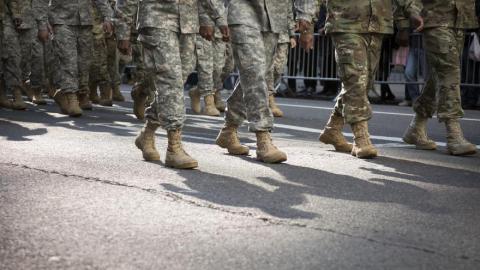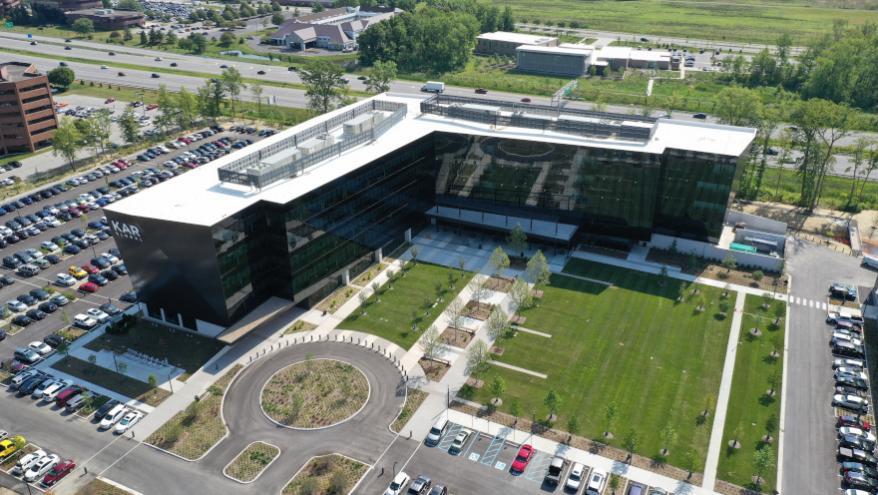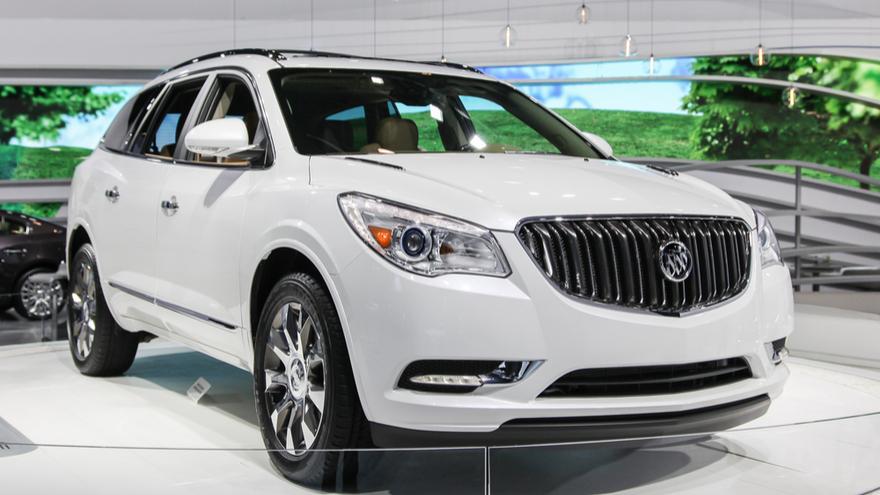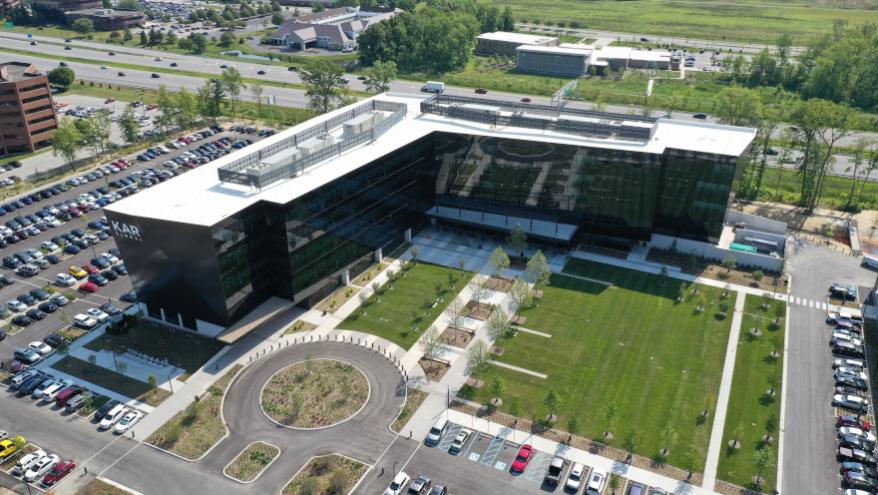For all U.S. military members and government employees renting vehicles for personal needs, Enterprise Holdings is reducing its minimum age to rent a vehicle from 21 to 18 years old.
Enterprise said that with the move, military and government employees will experience easier access to rental vehicles as they might need transportation during a time of restricted travel directives in response to coronavirus concerns.
The change is effective through the end of May at all U.S. Enterprise Rent-A-Car, National Car Rental and Alamo Rent A Car locations. Enterprise Holdings owns the Enterprise Rent-A-Car, National Car Rental and Alamo Rent A Car brands.
Enterprise Holdings operates a network of more than 6,400 U.S. locations, so the company is prepared to move vehicles quickly to high-demand areas as needed, said Will Withington, senior vice president, North American operations for Enterprise Holdings, in a news release.
“We are ready to work closely with all of our partners, including military and government agencies, during these difficult times,” Withington said.
Withington continued, “Our unwavering commitment to supporting members of the military and their families is always top of mind.”
Customers must show a valid military or government ID to be eligible.
In other news, Enterprise Rent-A-Car two days earlier said that to help university students get home, it would waive its young renter fee and reduce its minimum age to rent a vehicle from 21 to 18 years old. Like the military move, the change is also effective through the end of May at all U.S. locations.
The company noted that many students might need last-minute transportation as many U.S. colleges and universities announce campus closures in response to coronavirus concerns.
Reducing the age minimum and waiving the young renter fee might mean more students can access rental cars, Enterprise said.
“We want to do whatever we can to make this unprecedented situation easier for students and their families,” Withington said.
Withington continued, “With an Enterprise Rent-A-Car location within 15 miles of 90% of the U.S. population, we’re in range of nearly every college campus in the country and able to help students get wherever they need to go.”
Students ages 18 to 24 must provide a valid driver’s license and official student ID card to be eligible.
UPDATED with KAR Global clarification that ADESA will move to simulcast-only through April 3.
Amid the COVID-19 pandemic, ADESA auction locations in the U.S. and Canada are moving immediately to simulcast-only sales through April 3, parent company KAR Global said in a statement Monday afternoon.
Simulcast success fees for buyers and sellers are being waived through April 3.
The Manheim auction company made a similar move Monday, announcing that it would be shifting to Simulcast-only sales at all of its auction locations. The move was effective Monday and runs through April 3.
At KAR, the company is making this move to help ensure all of its teams, marketplaces, services and technology continue to be “safe, operational and ready to serve our customers,” KAR said.
Sales will continue at their regular times. However, cars will not run through the lanes, and dealers are not permitted inside the auctions during these sales. Dealers will be allowed onsite to preview vehicles and process titles/payments outside of sale hours.
AFC branches at ADESA auctions will remain open outside of sale hours.
Buyers can place bids through simulcast on ADESA.com, ADESA.ca or on the ADESA Marketplace app, but must have appropriate credentials. They also need buy permissions enabled on their ADESA.com or ADESA.ca accounts.
“Unless otherwise noted, our offices, branches and auction locations will remain open for normal business operations — including vehicle previews and title and payment processing — outside of scheduled sales,” KAR said in the statement.
“On sale days, the auctions will open for regular business including title and payment processing outside of sale hours,” it added. “Dealers may preview vehicles onsite up to and including on sale day but will not be permitted inside ADESA locations during sale hours.”
As for sellers, KAR is “strongly encouraging” reps to use the ADESA Simulcast Remote Seller platform versus attending in person.
“We are prepared to provide solutions to meet our customers’ remarketing needs including our digital marketplaces — always safe, convenient and effective alternatives to in-person sales. ADESA.com, ADESA.ca, ADESA Marketplace app and TradeRev and our private label websites for franchise dealers all remain active and operational,” KAR said.
Updates related to this matter can be found at ADESA.com/COVID19 or ADESA.ca/COVID19.
Alexi Venneri said Digital Air Strike understands how the coronavirus crisis is changing the way consumers want to engage with businesses.
“In response to that, we are helping our dealers and the automotive industry thrive while concurrently assisting to flatten the curve of this outbreak,” said Venneri, who is co-founder and chief executive officer of the company.
Digital Air Strike, a social media, lead response and consumer engagement technology company, on Friday introduced its Video Retailing Program. The company says the program can help dealerships handle more steps in areas such as prospect conversion, the full sales process, and vehicle servicing using video, virtual messaging and AI.
The Video Retailing Program aims to help consumers do more of their research, shopping, transactions, and vehicle delivery or servicing by using social distancing techniques powered by Digital Air Strike technology.
Dealerships will receive custom graphics, videos, video conferencing and training to implement services for helping consumers with health concerns while still buying or servicing vehicles.
The company is offering its Video Retailing Program at no charge for the next 30 days to all clients, and Venneri said the company will work to “refine and evolve” the program to “assist with community outreach and reinforce health best practices.”
The program can also help staff members who might need a work-from-home option but who still need to help consumers, Venneri said.
The Digital Air Strike Video Retailing Program uses the company’s Video Logix tool, paired with technology Digital Air Strike has already been providing to its clients. It uses video conferencing through Facebook Portals or iPads.
The company, which was founded in 2010 at the height of the Great Recession, has implemented training, custom videos and graphics, and campaign and in-dealership best practices to create a program that it says immediately lessens social contact. The program provides ideas to support concepts such as solo test drives, custom walk-around videos, and concierge delivery of vehicles for sales and servicing.
Digital Air Strike adopts Facebook’s Portal for business communication and says it has provided thousands of dealerships with the device. The company has developed consumer engagement, social media and reputation management technologies.
The company says technology is an important aspect in how it will help each dealership provide superior services while enabling dealership staff to communicate “face to face” with customers through video remotely, and if consumers choose to take delivery of their vehicle using social distancing with video while inside a dealership, instead of having direct contact with employees.
The company is providing an example of how to use the Video Logix tool, which is part of Digital Air Strike’s Video Retailing Program.
Digital Air Strike is also presenting free webinars on the new product, titled, “Start Video Retailing Today: Survive & Thrive During the COVID-19 Pandemic.”
In light of COVID-19 concerns, Manheim is shifting to Simulcast-only sales at all of its auction locations. The move was effective Monday and runs through April 3.
Manheim, which said in a letter from president Grace Huang that there are currently “no known confirmed cases of COVID-19” among its workforce, said its physical auctions and digital channels are “fully operational” for buyers and sellers to continue business, but they will have do so digitally.
In a phone interview Monday, Huang said there will be no buyers allowed in the lanes and that all vehicles will be sold via postcard sales.
The company is waiving all Simulcast buy and Simulcast sales success fees during this period.
On non-sale days, Manheim auction locations will remain open to sellers and buyers and operate normally. However, people are asked to maintain social distance.
“During sale day, seller representatives will be allowed to represent their vehicles, but we encourage all seller representatives to use our online seller tools,” Huang said in the letter. “Buyers may view vehicles on the lot but are asked to respect social distancing. However, buying dealers will not be allowed to enter the physical auction buildings or lanes during sale day.”
During the phone interview, Huang added that seller representatives are asked to leave the auctions after their cars run.
There will also be remote blocks available for seller reps that decide not to attend in-person. Auction staff will remain working inside, but are asked to maintain social distance.
Manheim has been preparing and investing in its digital capabilities for years, Huang said by phone.
With the technology up and running, Huang said Manheim was able to make the decision to go all-Simulcast with the course of several hours.
“At the end of the day, it came down to safety,” she said.
Eliminating large gatherings, like an auction sale day, was a way for the auction company to do its part, Huang said.
The all-Simulcast sales begin today, with Manheim North Carolina and Manheim Statesville first on deck.
“Working with our parent company Cox Enterprises, we continue to monitor the latest information from the CDC and WHO and state and public health agencies. As COVID-19 developments continue to evolve daily, we are reviewing our entire auction network for further operational actions — with safety guiding our every move,” Huang said in the letter.
In addition to the Simulcast-only sales, Manheim is also taking the following steps, as outlined in the letter:
- Having protocols in place to activate closures, deep cleanings and appropriate quarantine procedures should the need arise
- Halting all food service in our lanes and lots
- Extending cleaning crew hours
- Sending ongoing communications to team members to follow CDC sanitation guidelines
- Posting signs to remind team members, clients and visitors to wash and sanitize their hands often
- Any team members who feel ill are instructed to not report for work and communicate with their managers.
Given the fact that many parties — dealers, consignors, etc. — need Manheim’s services to operate their own businesses, the company has activated its Business Continuity Plan (BCP) for pandemic situations.
“The plan’s purpose is to ensure the continuation of services and to establish ongoing communications between key stakeholders as circumstances evolve. As part of our BCP, we are in contact with critical third-parties to verify their ability to provide continued support,” Huang said in the letter.
Those with questions or concerns are encouraged to reach out to their respective Manheim rep or visit MyManheim.com/COVID-19.
“As the situation continues to evolve, I want you to know that our team is prepared to address COVID-19 developments as they arise,” Huang said. “I am very grateful and humbled by the dedication of our team members, the loyalty of our clients and the support of our local communities.”
Manheim is also postponing its 75th anniversary celebration at Manheim Pennsylvania, which was orginally scheduled for later this month.
Cherokee Media Group responded to guidance from local and federal health experts as well as other event orchestrators about the increased risk associated with COVID-19 and rescheduled the Automotive Intelligence Summit; the in-person conference bringing together leading executives and entrepreneurs to discuss ideas and trends associated with mobility and connectivity, fintech solutions and digital retailing.
The event still will be conducted in Raleigh, N.C., but shifting to Aug. 17-19 from the originally slated timeframe of April 14-16. Cherokee Media Group president Bill Zadeits explained the company’s methodology for making the move.
“I’d like to state clearly that we are taking concerns about COVID-19 (commonly known as Coronavirus) very seriously,” Zadeits said. “The health and safety of our clients and their families, as well as our team and their families, is our top priority.
“Our team is closely following the CDC’s official Interim Guidance for Event Planners and the PCMA’s (Professional Convention Management Association) COVID-19 resource page for the most accurate, relevant and updated information and will be making the necessary and appropriate changes for our event to ensure a safe and successful meeting for all of us,” he went on to say.
The change involving AIS 2020 coincided with other industry events being forced into modifications, including organizers of the Conference of Automotive Remarketing postponing the 2020 CAR Conference, originally scheduled for later this month in Las Vegas, as well as the American Recovery Association moving the North American Repossessors Summit to the beginning of October.
“Our team possessing more than a dozen years of wide-ranging experience ensures that we can navigate extreme challenges when hosting our industry-leading events,” said Marilu McQuilkin, Cherokee Media Group’s senior director of marketing and events. “Our pledge is to orchestrate the Automotive Intelligence Summit with the same excellence the industry has come to know with our other events, including Auto Remarketing Canada, Women & Automotive and Used Car Week.”
All registrations, sponsorships and speakers for the Automotive Intelligence Summit will convey the new dates of Aug. 17-19. Because of the date shift, early bird discounts to the Automotive Intelligence Summit have been extended until July 17.
Should there be any scheduling conflicts, Cherokee Media Group will work diligently with impacted individuals and companies to smooth challenges as much as possible.
McQuilkin also noted that anyone who already made hotel reservations with the Crabtree Valley Marriot in Raleigh, N.C., in the room block connected with the Auto Intelligence Summit will automatically have those arrangements canceled. There is no need for individuals to call the hotel to make the cancelation.
Furthermore, McQuilkin said Cherokee Media Group made a new hotel registration link available, keeping the original discounted rate intact for AIS 2020.
“We are excited about the great speaker lineup and energy that is building around this event, the new business opportunities, the new people we’ll meet and the new things we will all learn,” Zadeits said.
For the latest information about the Automotive Intelligence Summit, visit www.autointelsummit.com.
As the coronavirus crisis continues, the J.D. Power 2020 Customer Service Index Study released Thursday marks the fifth consecutive year of increasing satisfaction with dealer service.
However, Chris Sutton says it is unknown how widespread or long-lasting the ripple effect of the coronavirus will be for the automotive industry.
“It inevitably will have a financial effect on dealers’ service business,” said Sutton, who is vice president of the U.S. automotive retail practice at J.D. Power, in a news release. Sutton said automakers and dealers should prioritize securing sources for their parts supplies. Otherwise, they could face the consequences of losing business.
As the crisis continues to interrupt global supply chains, auto dealers are bracing for parts shortages that could undermine customer satisfaction gains that have taken place over the past few years. But in this year's J.D. Power study, overall satisfaction increases to 837 on a 1,000-point scale.
Crisis could undermine satisfaction
That marks the fifth consecutive year of increasing satisfaction.
In a ranking of brands, Lexus ranks highest in satisfaction with dealer service among luxury brands. Buick ranks highest in satisfaction with dealer service among mass market brands for a fourth consecutive year.
As the coronavirus crisis unfolds, however, the ability to perform prompt service and repairs could be undermined. Sutton said customers at first will be understanding of coronavirus consequences, but shortages could continue well beyond the current public health crisis. Customers in August might not understand why no parts are available to repair their vehicles, for example.
“Performing work right the first time is the most critical activity for service satisfaction, and dealers now do a good job by successfully completing work 94% of the time,” Sutton said.
Sutton continued, “Under normal circumstances, 20% of the work that isn’t completed the first time is due to parts being unavailable, which is a source of frustration for customers. That 20% could dramatically increase due to parts suppliers’ extended shutdowns in China and other locations. When parts are unavailable, customer satisfaction and intended loyalty significantly decline.”
When parts are unavailable, overall satisfaction declines 155 points among luxury vehicle owners. Among owners of mass market vehicles, a 141-point drop in satisfaction occurs when parts are unavailable. In business terms, that decline means a drop from 63% to 30% of owners in the luxury segment who say they “definitely will” return for service.
That drop is down to 26% from 58% in the mass market segment.
The study measures satisfaction with service at a franchised dealer or independent service facility for maintenance or repair work among owners and lessees of one- to three-year-old vehicles. It also shows a numerical index ranking of the highest-performing automotive brands sold in the United States, which is based on the combined scores of five different measures (in order of importance): service quality (27%); service initiation (20%); service adviser (20%); service facility (17%); and vehicle pick-up (16%).
Key findings
The study is based on responses from 71,286 verified registered owners and lessees of 2017 to 2019 model-year vehicles.
The study was fielded from August through December 2019.
One key finding of the 2020 study: Time is most important. Customers rate the total time to complete service on their vehicle and amenities offered by the dealership the lowest (in a tie) of 16 analyzed attributes. Fairness of charges is the third-lowest attribute.
Courtesy of service adviser, cleanliness of dealership and knowledge of service adviser are the highest-rated attributes.
Another key finding: Younger customers’ higher expectations continue, but the gap is narrowing: Gen Y customers, who are between ages 25 and 42, represent a growing percentage of new-vehicle buyers. Younger customers historically express lower satisfaction than older customers, and this year’s study shows that to be the case.
However, when compared to similarly aged customers 15 years ago, overall satisfaction of those in the age group of 25-44 was 57 points lower than among those aged 45 and older. Gen Y customers now show higher intended dealer loyalty for paid service work than similarly aged customers did 15 years ago.
Other key findings are that fewer miles and longer service intervals decrease interactions between dealers and customers and that dealers capture a greater percentage of service visits. Dealers capture 88% of customers’ annual service visits in the first three years of ownership compared to non-dealers, and that is up from 79% in 2015.
The study provided more detail on brands. After Lexus, Cadillac and Porsche ranked second in a tie regarding satisfaction with dealer service among luxury brands. Infiniti ranked fourth and Lincoln ranked fifth.
After Buick among mass market brands, Chevrolet ranked second, followed by GMC, Mitsubishi and Toyota.
Sutton said that aside from supply issues, the service business could face several long-term challenges. Vehicles require less-frequent maintenance. Because owners are driving fewer miles and stretching out the time between service visits, dealers should do everything they can to boost satisfaction.
“Retaining customers as vehicles age and warranties expire is key for dealers, especially as the sales market slows,” Sutton said.
Sutton continued, “Simple things like returning a vehicle to the customer cleaner than when it was brought in can increase satisfaction scores by 31 points, and dealers do this less than half the time. There’s no time to slack on delivering what customers expect if service departments are to continue to comprise a large percentage of dealership profitability.”
As concern around the COVID-19 coronavirus mount in the auto industry and beyond, the organizers of the Conference of Automotive Remarketing have postponed the 2020 CAR Conference, originally scheduled for later this month in Las Vegas.
“As the organizer of The CAR Conference, we have been in close communication with our key partners including NAAA, IARA, the IAG and our key sponsors including Cox Automotive, KAR Global, ServNet, America’s Auto Auction and IAA, among others,” Bobit Business Media said in a statement. “For 25 years, CAR has become a true gathering place for the industry and an incredible place to network, learn, and conduct business. None of this would be possible without our partners on this event so we wanted to weigh all of our alternatives and listen to each and every constituency that invests in this event alongside Bobit Business Media.
“After a great deal of discussion, we have jointly decided to postpone the 2020 CAR Conference. The safety and health of our attendees and partners is of paramount importance at this time,” it continued. “With that in mind, please stay tuned for more information from Bobit Business Media, IARA, and NAAA about our updated plans.”
The organization went on to offer thanks to its partners in the event.
“We couldn’t do it without you and we won’t do it without you. The NAAA and IARA, along with the senior leadership at Cox Automotive, KAR Global, ServNet, America’s Auto Auction and IAA, have all been incredibly supportive throughout this process and we look forward to putting together a great remarketing event with all of you down the road,” Bobit Business Media noted.
The company encourages those with questions regrading their participation to contact the customer service team at 1-800-576-8788 or email [email protected].
Dealers certainly are a resilient bunch, but they understand the challenges they currently face as reflected in the Q1 2020 Cox Automotive Dealer Sentiment Index released on Monday.
U.S. dealers’ view of the current automotive market remains negative and is mostly unchanged from the fourth quarter. However, dealers see improvements coming in the spring.
According to the latest index, the first-quarter reading came in at 49. Cox Automotive said the rating was slightly more positive than last quarter, but the increase from the fourth quarter index score of 47 was not statistically significant.
Year-over-year, Cox Automotive pointed out the current market index was up by only 1 point, which was not statistically significant and remained below 50, indicating more dealers view conditions as weak rather than strong.
Cox Automotive noted that the quarterly survey was orchestrated in late January and early February; a timeframe that included the Senate impeachment trial of President Trump and before the spreading economic worries — and stock market volatility — fueled by concerns about COVID-19.
As the CADSI has consistently demonstrated, Cox Automotive indicated the current market sentiment skews more positive for franchised dealers compared to independent dealers, who sell only used vehicles. The gap expanded this quarter after narrowing in the fourth quarter with franchised dealers becoming more positive about current market conditions — increasing from 51 in Q4 to 55 in Q1 — while independents remained negative at 47, up only one point from the fourth quarter.
“The start of 2020 seems to have favored franchised dealers over independents,” Cox Automotive chief economist Jonathan Smoke said in a news release. “All dealers are optimistic about the spring, but the strong start of the year has made franchised dealers the most optimistic we have seen since the beginning of 2018.”
When it comes to views of the future, the index showed dealer types moved farther apart in the Q1 numbers, as well. Franchised dealers registered in at 66, the highest for the three-month market outlook since Q2 of 2018, while independents increased to 61.
Both store categories showed strong quarter-over-quarter increases in optimism for the next three months — a typical spring bounce — but no substantial change year over year, according to Cox Automotive.
Derived from a quarterly survey that Cox Automotive issues to a representative sample of franchised and independent dealers from around the country, the CADSI measures dealer perceptions of current retail auto sales and sales expectations for the next three months as “strong,” “average,” or “weak.”
The survey also asks dealers to rate new-vehicle sales and used-vehicle sales separately along with a variety of key drivers, including consumer traffic. Responses are used to calculate an index by which any number over 50 indicates that more dealers view conditions as strong rather than weak.
Franchised dealers eye upticks in used sales
Based on the way dealers see the market, Cox Automotive indicated used-vehicle sales stayed flat overall in Q1 compared to last quarter with an index score of 53, meaning more dealers believe the market is strong for used vehicles.
For franchised dealers, the used-vehicle sales index was directionally higher on a sequential basis, moving from 66 to 72.
Cox Automotive pointed out the gap between dealer perception widened to 25, the largest in dealer sentiment index history, meaning franchised dealers are far more positive about used-vehicle sales than their independent counterparts.
Survey orchestrators found the perception of used-vehicle sales from independent dealers showed a decline from last quarter and year-over-year, with an index rating of 47 in Q1, down from 49 in Q4.
The index rating of 47 in the first quarter was the lowest score since the fourth quarter of 2018, according to Cox Automotive.
At 53, the survey showed the aggregate used-vehicle inventory index overall stayed consistent compared to last quarter and last year, with both franchised dealers and independents reporting inventory as growing.
Cox Automotive mentioned another notable trend in the used space. Across independents broken down by size, large independent stores (inventory of more than 50 vehicles) saw significant growth while small independent dealerships (14 vehicles or less) saw a significant decline from the prior quarter.
CADSI results also showed the view of new-vehicle sales was up slightly compared to last year and stable compared to last quarter.
The new-vehicle sales index remained above 50, indicating a good market, according to Cox Automotive, which said, “Franchises, however, continue to see the used market as stronger than the new market.”
Expenses still on the rise
According to the Q1 2020 CADSI, the costs category saw a statistically significant increase compared to the prior quarter, showing that dealers feel expenses are growing.
Meanwhile, Cox Automotive noticed the profit index sustained a significant decline, dropping to 40, which reflects a weaker profitable environment in the first quarter and aligns with the view of increasing costs.
By filtering on only dealers who described their costs as growing, the survey team found that the more negative view is being driven by overhead expenses, including payroll, labor costs and staffing.
Of the independent dealers who had growing costs in the previous quarter, Cox Automotive learned that many operators felt that marketing and advertising were contributing to their growing costs.
In addition to marketing and advertising expenses, franchised dealers also felt that new technology and updates to existing technology were expanding their costs, according to the newest CADSI.
On the positive side, Cox Automotive noticed the economy index generated an increase from the fourth quarter.
Independent and franchised dealers both registered in on the economy at 57, which represented a quarter-over-quarter increase of at least 2 points.
At 57, the economy index is above 50, “meaning that dealers collectively see the economy as strong,” according to Cox Automotive
Factors holding back dealer business
Cox Automotive also discovered the top five factors holding back the business across all dealers shifted only marginally from the fourth quarter to the first quarter.
Competition and market conditions exchanged index positions as competition rose to the top spot, cited by 34% of dealers, and market conditions dropped to second.
Study orchestrators noted credit availability and limited inventory remained in the third and fourth spots in Q1, same as in the previous quarter. They added that expenses reentered as No. 5, up from No. 6 in the last quarter.
Cox Automotive learned that views of the top factors holding back business also dramatically by type of dealer.
For franchised dealers, market conditions remained the top concern, and the percentage of franchised dealers citing it as a factor holding back their business decreased only slightly to 34%. Competition remained in the No. 2 position at 32%, beating out weather at 23%.
The CADSI showed the political climate continues to climb the factor ranking for franchised dealer and was No. 4 at 23%.
Lack of consumer incentives from OEMs made its debut in the top five factors for franchised dealers, increasing from 15% in the fourth quarter to 21% in the first quarter.
For independents, Cox Automotive discovered competition moved into the top spot, with 35% of dealers calling it a top factor holding back the business. Credit availability for consumers rose to the second factor, and market conditions dropped to third from first.
The CADSI went on to mention limited inventory remained in the fourth spot among independents, unchanged from last quarter. Expenses moved from sixth in the fourth quarter to fifth in the first quarter.
Cox Automotive added scores regarding dealer perception of the political climate holding back their business increased overall, as the political climate factor increased to 19% moving up two spots from last quarter to become the sixth most important factor.
Franchised dealers consider the political climate to be consistent with last quarter’s as a No. 3 factor, while independents’ concern over political climate moved to seventh from eighth last quarter.
For dealers who deem the market to be weak over the next three months, Cox Automotive said concerns primarily revolve around the election and political climate.
Said one dealer in the survey, “It’s an election year and there’s an impeachment trial going on. Political uncertainty always affects the market.”
Cox Automotive reiterated the survey was happening in late January during the Senate impeachment trial of President Trump.
Lack of consumer incentives from OEMs also rose from No. 10 to No. 5 quarter over quarter as a factor holding back the business.
In Q1, franchises’ perception of OEM incentives stood at 47, dropping slightly from last quarter and remained below the 50 threshold, which means the majority of franchised dealers consider OEM incentives to be small or ineffective.
For dealers who considered OEM incentives small, they mentioned restrictiveness and as well as concerns about OEM stair-step programs. “There are specific programs that used to be available for the consumer that are now restricted heavily,” one dealer said.
Cox Automotive Dealer Sentiment Index methodology
Data for the Cox Automotive Dealer Sentiment Index is gathered via online surveys. The Q1 results were based on 1,084 dealer respondents across the country from Jan. 27 to Feb. 10.
Dealer responses were weighted by dealership type and volume of sales to be representative of the national dealer population.
For each aspect of the market surveyed, respondents are given an option that relates to strong/increasing, average/stable, or weak/decreasing, along with a “don’t know” opt-out. Indices are calculated by creating a mean score in which:
Strong/increasing answers are assigned a value of 100.
Average/stable answers are assigned a value of 50.
Weak/declining selections are assigned a value of 0.
Respondents who select “don’t know” at a particular question are removed from the related index calculation. The total metrics reported have a margin of error of plus or minus 3.0%.
To download the full results of the Q1 2020 Cox Automotive Dealer Sentiment Index, go to this website.
In response to the COVID-19 coronavirus, Manheim is requesting that employees avoid international business travel through the end of the month, while limiting domestic business travel and large group meetings in the same time frame.
That’s according to a statement provided by the auction company on Friday, which said Manheim is activating its Business Continuity Plan for pandemic situations.
Manheim is also asking team members to undergo a 14-day home quarantine if they have been to Level 3 countries or been in close contact with someone who has done so, per Center for Disease Control suggestions.
“At Manheim, the health and safety of our team members, clients, partners and guests is our top priority,” Manheim president Grace Huang and Patrick Brennan, senior vice president of Manheim Marketplace, said in a statement.
“With locations across the country, we continually plan for situations that have the potential to impact our operations such as hurricanes, winter storms and more. I want to take some time to assure our team members, clients and those in our local communities that our team is prepared to address COVID-19 developments,” they said.
“Working closely with Cox, our parent company, we are taking multiple steps to maintain services provided to clients while ensuring the safety of those within our business reach. We are in close contact with government and health officials as this situation evolves.”
Manheim is taking additional steps to limit COVID-19 exposure, including “protocols that activate closures, deep cleanings and appropriate quarantine procedures should the need arise.”
Food service will temporarily stop at Manheim auction lanes and lots and cleaning crew hours will be extended.
Manheim is also encouraging those who prefer not to attend sales in person to use the company’s digital channels.
“We recognize manufacturers, auto dealers, partners and other organizations rely on Manheim services to operate. As a result, we have activated our Business Continuity Plan (BCP) for pandemic situations,” Huang and Brennan said.
“The plan’s purpose is to ensure the continuation of services and to establish ongoing communications between key stakeholders as circumstances evolve,” they said. “As part of our BCP, we are in contact with critical third-parties to verify their ability to provide continued support. Should you have any questions or concerns, please reach out to your Manheim representative.”
This follows similar news from ADESA parent comapny KAR Global, which announced a precautionary measure Tuesday, restricing air travel for its employees through March 31.
In a news release, KAR stressed that this temporary measure is a proactive one, and “not in response to any heightened or specific threat of exposure or spread of e virus across its 200 operating locations and communities.”
As part of the restriction, KAR has decided not to participate in a few upcoming industry events and has cancelled in-person customer events and meetings where air travel is needed.
However, the company emphasized that its operating locations will remain open. That includes its 75 auto auctions, which continue to host sales as scheduled. KAR’s online and mobile marketplaces will also remain open.
“Safety is always one of KAR Global’s highest priorities, and this includes protecting the health and wellbeing of our employees, their families and the communities in which we live and work,” KAR chairman and chief executive Jim Hallett said in a news release.
“While reports on the extent of the outbreak and the severity of infection have been inconsistent, there is no question the virus is capable of impacting large populations and geographies,” Hallett said. “We’re committed to doing whatever we can to help reduce the risk of exposure and any further spread of this virus.”
In light of the COVID-19 coronavirus outbreak, KAR Global is taking a precautionary measure, announcing a temporary air travel restriction for its employees through March 31.
In a news release, KAR stressed that this temporary measure is a proactive one, and “not in response to any heightened or specific threat of exposure or spread of the virus across its 200 operating locations and communities.”
As part of the restriction, KAR has decided not to participate in a few upcoming industry events and has cancelled in-person customer events and meetings where air travel is needed.
However, the company emphasized that its operating locations will remain open. That includes its 75 auto auctions, which continue to host sales as scheduled. KAR’s online and mobile marketplaces will also remain open.
“Safety is always one of KAR Global’s highest priorities, and this includes protecting the health and wellbeing of our employees, their families and the communities in which we live and work,” KAR chairman and chief executive Jim Hallett said in a news release.
“While reports on the extent of the outbreak and the severity of infection have been inconsistent, there is no question the virus is capable of impacting large populations and geographies,” Hallett said. “We’re committed to doing whatever we can to help reduce the risk of exposure and any further spread of this virus.”
Dealers can visit KARGlobal.com for updates and ADESA.com for physical sales schedule changes.
“To be absolutely clear, we remain fully operational and open for business,” Hallett added. “But we continue to monitor this evolving situation and will strictly adhere to any federal, state and local measures or mandates.
“Should any locations become locally impacted, we have contingency and business continuity plans in place to mitigate any disruption to our business. And our online and mobile app marketplaces will continue to provide dealers a digital alternative to attending sales in-person.”
Impact to wholesale market
As far as the potential impact of the coronavirus to the overal wholesale auto market, it is dependentant on a number of factors, such as the global new-vehicle and parts supply chain and how the U.S. and global markets react or overeact, via metrics like consumer confidence and spending, oil prices and gross domestic product.
That's according to Black Book, which boiled down potential impacts as part of its latest Market Insights report.
Potential market impacts tend to fall under short-term (up to 12 months) and long-term impacts (one to three years).
“If there are no immediate major market meltdowns beyond last week’s market correction (i.e. consumer confidence does not dramatically change), we believe that the wholesale market will strengthen in the short term,” Black Book said in the report.
“On the other hand, prolonged economic slowdown due to the disruption of trade and the decrease in consumer confidence (resulting in a large drop in GDP) will have a negative effect on wholesale prices,” it said.
On the demand side of the wholesale market, Black Book, calling it a short-term impact, contends that a boost in online activity would offset any drop in attendance at physical auctions.
“We believe that this shift will have a minimal effect on wholesale prices,” Black Book said.
Also on the short-term basis, the wholesale demand could be impacted by a disruption in the new-vehilce supply chain.
“There are reports that indicate delays in new inventory delivery due to factory closures in Asia. If this continues for the next several months, we will see an increased demand on newer, used vehicles that will cause the strengthening of used prices on 0-4-year-old models,” it said.
The macroeconomic factors could have a short- and long-term influence on wholesale demand, Black Book said, citing factory closures as well trade and travel disruptions could lead to a slowdown in the economy or a mild recession.
In terms of wholesale supply, Black Book sees potential short-term impact from disruption to the parts supply chain.
“Similar to the new vehicle supply chain, there are concerns about the automotive parts supply chain. Effects of the virus could result in the reduction of available used units on the wholesale market (due to difficulties to repair / recondition of units),” Black Book said.
“Limited supply of desirable vehicles may cause wholesale prices to increase on cleaner, newer models,” it added.
Lastly, Black Book emphasized: “We urge everyone to consult qualified medical professionals for any questions related to the actual virus and precautions that should be taken. Staying rational, calm, and informed is important and could save lives.”
More broadly speaking, S&P Global Ratings examined potential global credit and economic impacts, some of which tie into automotive.
“Industries reliant on consumer discretionary spending (such as travel and high-end retail) and cross-border supply chains (such as auto, electronics, and chemicals) are particularly exposed from a credit perspective, given the increased pressure on revenue and earnings. Fallout for equities and double-digit spreads for some credits illustrate the ferocity of COVID-19's impact on capital markets,” S&P said in a news release.
“While epidemiologists continue to investigate the transmissibility, severity, and other features of the virus, the level of uncertainty remains very high. The spread and timing of the epidemic — and the government, business, and consumer response–will ultimately determine the overall impact on economic and credit conditions globally, including the speed and shape of recovery. Downside risks include the epidemic spreading beyond the second quarter of 2020 or escalating into a full-blown global pandemic,” it added.











